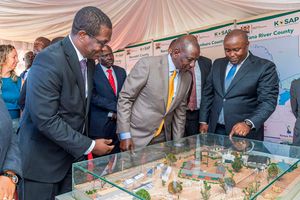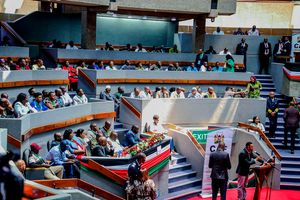
Principal Secretary State Department for Housing and Urban Development Mr Charles Hinga during a past event.
The government is at risk of losing Sh7.2 billion in World Bank funding earmarked for urban support programmes due to delays in passing the County Governments Additional Allocation Bill, which is crucial for disbursement.
Housing Principal Secretary Charles Hinga, while appearing before the Housing, Urban Planning and Public Works Committee of the National Assembly over the 2025 Budget Policy Statement (BPS), said that while the funds are available, they cannot be disbursed to counties until the law is in place.
The funding is a conditional grant to the county governments through the State Department for Housing, for the second Kenya Informal Settlement Improvement Project (Kisip) II and the second Kenya Urban Support Programme (Kusp) II.
“We are not able to disburse the funds to the counties because of the delayed enactment of the County Governments Additional Allocation (CGAA) Bill 2024,” said Mr Hinga following an intervention from Bahati MP Irene Njoki.
“The PS needs to tell us the impact of the delayed disbursement of these funds,” said Ms Njoki.
Although PS Hinga told the Committee chaired by Emurua Dikir MP Johanna Ngeno that talks between the government and the World Bank representatives to save the funding are ongoing, he gave a hint of a situation that is dicey, which can only be unlocked with a substantive law.
“The lack of a legal framework is really causing anxiety between us and the World Bank. But there is an ongoing mediation between the government and World Bank,” said Mr Hinga.
People's livelihoods
The PS fell short of telling the committee that any further delays in having the law in place may see the funds recalled by the donor and utilised in another country.
The County Government Additional Allocation Bill is enacted annually to ensure that the donor funds are disbursed to the counties to support various projects to improve people’s livelihoods.
The Bill is introduced in the House immediately the County Allocation of Revenue Bill has been enacted by Parliament.
However, the 2024 version was lost after the period within which it was required to be enacted lapsed, meaning that a new version of the Bill will be required to be published.
The Bill was passed by the Senate and transmitted for reconsideration to the National Assembly, which approved it with amendments, paving the way for a mediated version.
But the 30 days within which the mediation committee, with representation from the two House, was to consider the Bill and come up with another version, lapsed before striking an agreement, meaning that the Bill had been lost.
The two world bank projects are undertaken in 77 municipalities and two special municipalities- Kakuma and Dadaab refugee camps in 45 counties across the country, save for Nairobi and Mombasa.
“We give the counties money based on their population as per the 2019 census report,” said PS Hinga.
Phase I of the funding saw over 300 projects comprising waste management (liquid and solid), storm water drainage infrastructure connectivity, fire and disaster management facilities or equipment and urban socio-economic infrastructure such as markets, implemented.
“These interventions have improved the health and livelihoods of people across the country,” said the PS.
Records at the State Department for Housing show that the 2019 census demonstrates that there is rapid urbanization which continues to be a challenge to the managers of the devolved units.
“There is therefore a deliberate need to direct resources towards urban development in order to achieve the aspirations of making Kenya an upper middle-income nation by the year 2030,” the government documents before the Housing Committee state.
According to the Ministry of Lands, Kusp II aims to build on the achievements and lessons learned from both the Kenya Devolution Support Program (KDSP) and Kusp.







